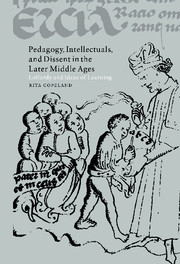Book contents
- Frontmatter
- Contents
- Acknowledgments
- General introduction: pedagogy and intellectuals
- PART 1 From pedagogies to hermeneutics: childhood, the literal sense, and the heretical classroom
- PART 2 Violent representations: intellectuals and prison writing
- Bibliography
- Index
- CAMBRIDGE STUDIES IN MEDIEVAL LITERATURE
PART 1 - From pedagogies to hermeneutics: childhood, the literal sense, and the heretical classroom
Published online by Cambridge University Press: 22 September 2009
- Frontmatter
- Contents
- Acknowledgments
- General introduction: pedagogy and intellectuals
- PART 1 From pedagogies to hermeneutics: childhood, the literal sense, and the heretical classroom
- PART 2 Violent representations: intellectuals and prison writing
- Bibliography
- Index
- CAMBRIDGE STUDIES IN MEDIEVAL LITERATURE
Summary
INTRODUCTION
From antiquity onwards, the literal sense was used as more than a mechanism of hermeneutical distinction. It was used to separate children from adults, childish learning from mature textual apprehension. As such, it was also a measure of discrimination enacted on the bodies of children, and a form of symbolic infantilization enacted on the bodies of certain classes of adults. Pursuing a diachronic genealogy, I consider here how pedagogical discourses of ancient intellectual lineage left their imprint on the most sharply politicized categories of late-medieval culture: from Quintilian, Plutarch, and Macrobius through early- and later-medieval discourses of education to late-fourteenth-century debates in England about lay learning, hermeneutical agency, and the political subject.
Clifford Geertz has remarked that common sense, including notions of the literal sense, “remains more an assumed phenomenon than an analyzed one.” To be sure, the hermeneutical tradition of the literal sense, that tendentious, thorny, academic and theological tradition of debate about literal and figurative, or literal and spiritual reading of canonical and sacred texts – a tradition that extends from antiquity, from Middle Platonist and Neoplatonist theologizing of Homer and other poets – has been the object of minute analysis for the history of ideas, especially for the history of hermeneutics. But there is another long tradition of the literal sense that, by comparison, has been so taken for granted, has been so much an assumed phenomenon, that its most powerful manifestations are scarcely remarked.
- Type
- Chapter
- Information
- Pedagogy, Intellectuals, and Dissent in the Later Middle AgesLollardy and Ideas of Learning, pp. 51 - 54Publisher: Cambridge University PressPrint publication year: 2001



